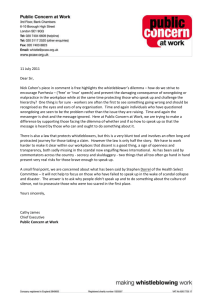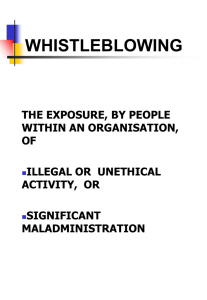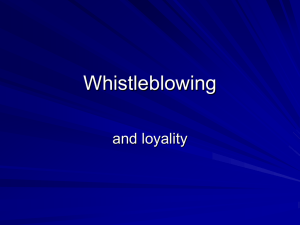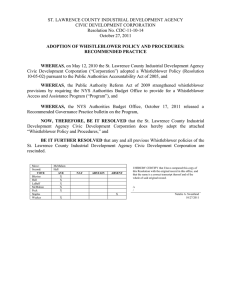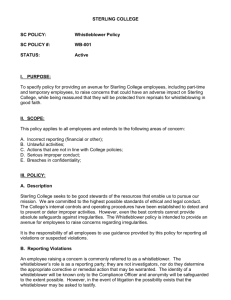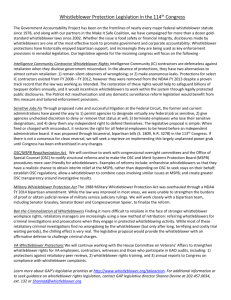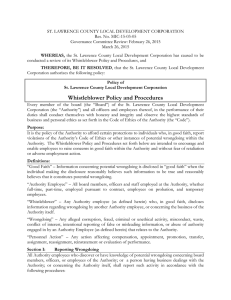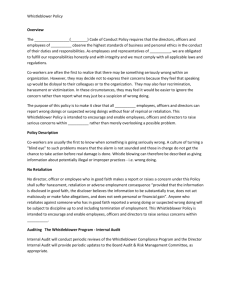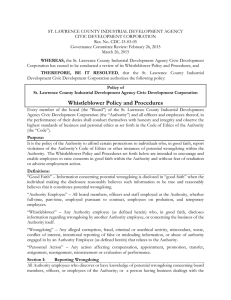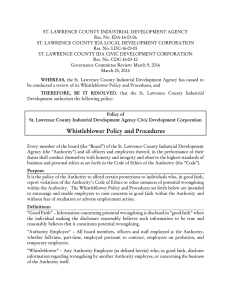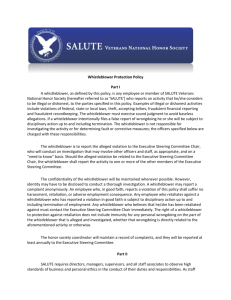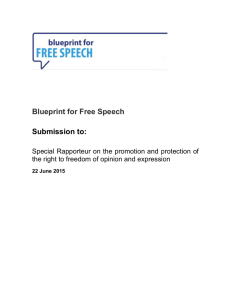Whistleblower-Protection
advertisement
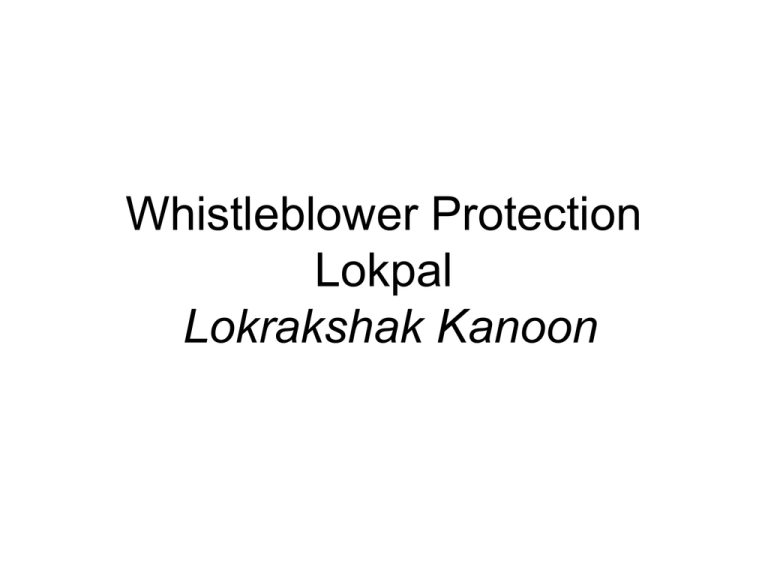
Whistleblower Protection Lokpal Lokrakshak Kanoon Scope of the Whistleblower Protection Act The scope of the act should be limited to: • Defining the mechanism for protecting the identity of the whistleblower • Protecting the whistleblower from victimization/harm. As there are other laws that cover threats and violence, the scope of the act could be limited to covering those aspects which are not illegal and are within the discretionary administrative powers of the organisation (transfers, holding up promotions, holding back benefits, other types of discriminatory behaviour) • Act should not detail the process of inquiring into and disposing the complaint filed by the whistleblower Offences covered under the Act • Corruption (as defined in Prevention of Corruption Act) • Criminal actions • Misuse of powers or discretion Actions that have an impact on society • Environmental destruction • Threats to public safety • Threats to public health Who is a whistleblower? • People working within a government organisation exposing wrongdoing within their org • People not working within a government organisation, if they expose wrongdoing in a government organisation • Employees of non government organisations (private sector companies, NGOs etc.) who expose wrongdoing within their organisations • RTI users by virtue of filing applications with the purpose of exposing or preventing wrongdoing (as defined in this Act) Issues with covering the non government sector under the Act • Will the government be empowered to interfere in the functioning of private sector companies/NGOs and prohibit them from transferring, punishing or even sacking employees? • Perhaps appropriate provisions could be built into the labour and company laws. Issues with covering RTI users under the Act • Is it possible to protect RTI users from attacks/harm under this Act? • A suggestion is that RTI users under threat can register a complaint with the area SHO and the SHO will be required to take all necessary steps to protect the RTI user, including providing police protection. And if the threat is carried out, action be taken against the SHO. • Where an RTI application has been filed in order to expose some wrongdoing (as defined under this Act) and the applicant is attacked, resulting in grievous injury or death, then it would be the legal responsibility of the government to ensure that the information that was being sought is speedily put into the public domain. Protecting the identity of the Whistleblower • If a whistleblower requests that his/her identity be protected, the name and other details of the whistleblower would be removed from the complaint and an alias (like a roll number) could be given. • If it is felt that it is necessary to reveal the identity of the whistleblower, it would be done : – when the competent authority is convinced that this is essential for a proper conduct of the enquiry/investigation – when adequate advance notice is given to the whistleblower and he/she is given an opportunity to be heard before a final decision is taken – where all measures to protect the whistleblower are put into position prior to revealing the identity, so as to minimise adverse consequences. Competent authority to receive complaints from whistleblowers • • • • • If offences other than corruption are covered, then it would not be appropriate to designate only the anti-corruption agencies as competent authorities Each concerned department/ministry authorised to receive complaints would have to have their own whistleblower protection mechanisms in position. Therefore, perhaps an independent committee needs to be created that is empowered to receive complaints against public servants above a certain level, or against organisations. This committee could protect the identity of the whistleblower and send the complaint onwards for investigation to the appropriate authority with an alias. Perhaps the chief information commissioner, the CVC or SVC, and chairperson of the lokpal/lokayukta could be members of this committee at the central/state level respectively. Obligation to report wrongdoings • Apart from spelling out the rights of whistleblowers, the bill could also make it obligatory for people, especially those working within an organisation, to blow the whistle every time they become aware of a potential or an actual wrongdoing • Relevant laws could be amended to make those who do not report wrongdoing, culpable as arbettors to the wrongdoing.
